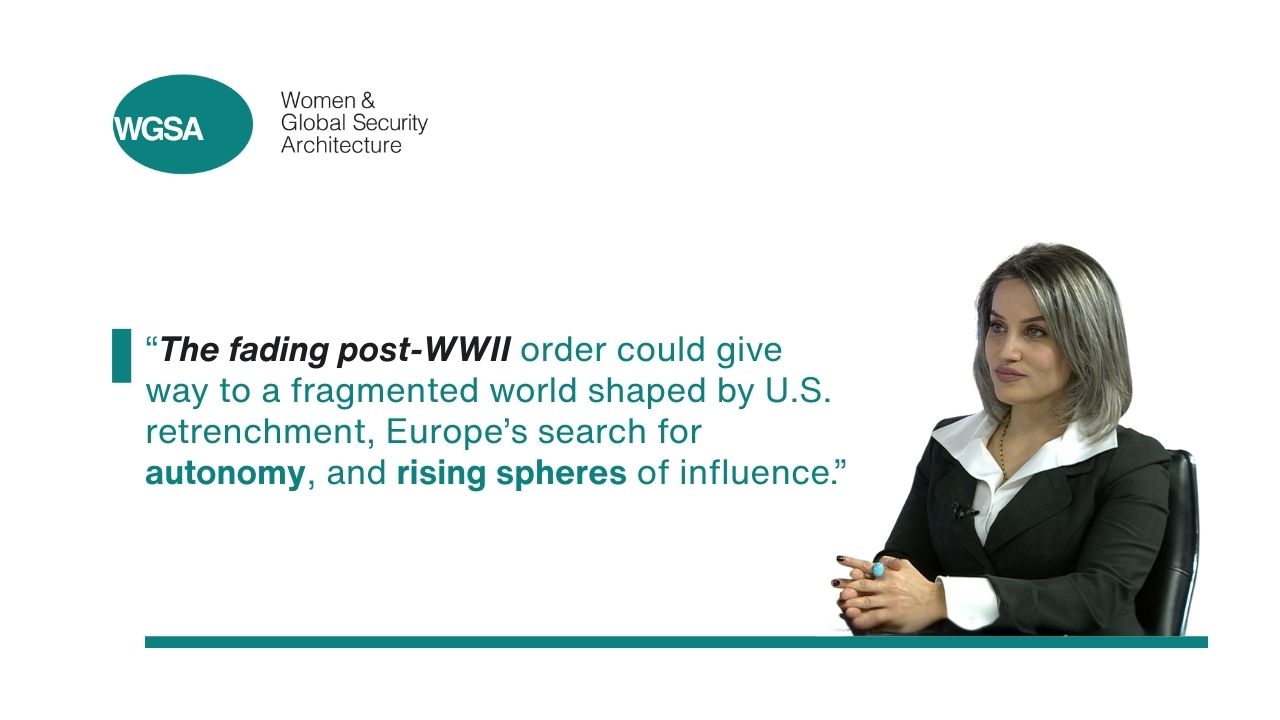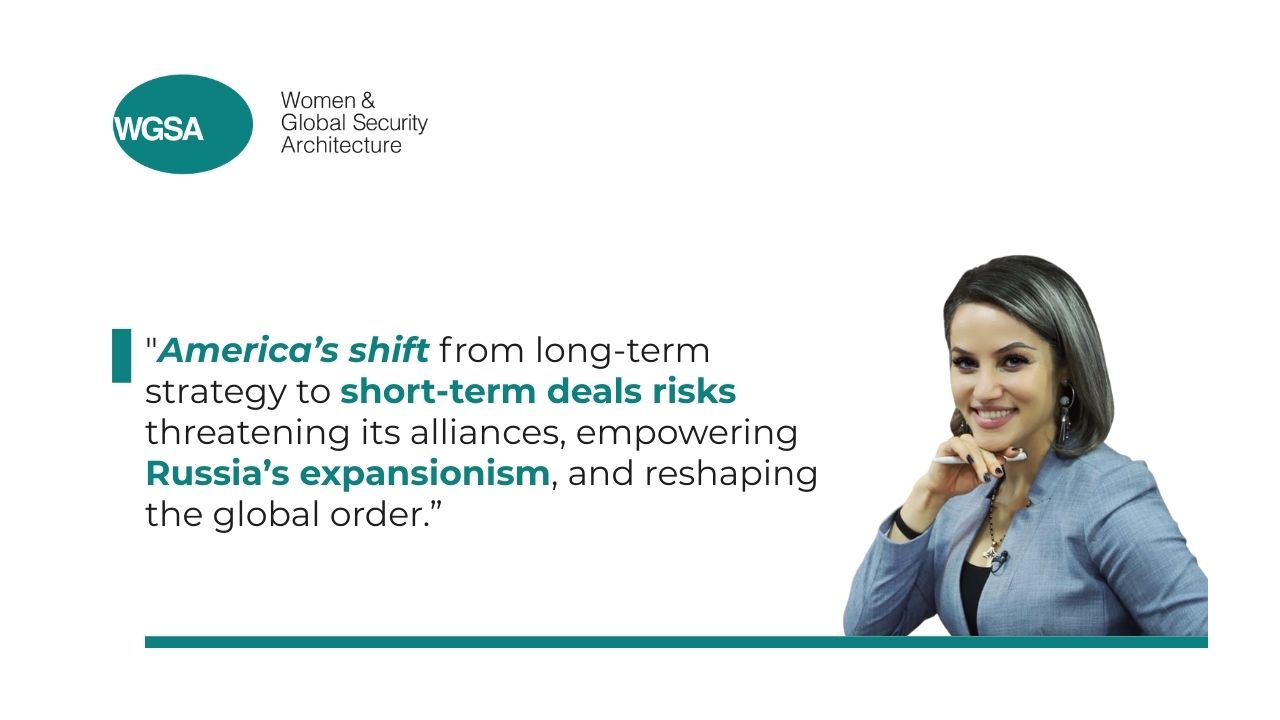The Changing Global Landscape: A Shift in the Post-World War II Order

By Elen Hokhikyan, WGSA Associate Expert
The world as we knew it, shaped by the post-World War II international order, is fading. Recent developments prompted discussions about the emergence of a new geopolitical landscape. President Trump’s actions during his second term – ranging from imposing tariffs on traditional allies like Canada and European Union nations to halting military support for Ukraine and fostering closer ties with authoritarian leaders like Russia’s Vladimir Putin—have disrupted the global equilibrium. These shifts have raised concerns about growing geopolitical instability and the emergence of a new hierarchical world order, dominated by spheres of influence.
Fragmentation of Europe and the Global Shift
One of the most pronounced effects of the changing global dynamics is the growing sense of insecurity in Europe. The perceived unreliability of the U.S. has prompted European leaders to reevaluate their historical reliance on traditional alliances. France, long a proponent of strategic autonomy, has been joined by other European nations in pushing for greater independence in defense matters. This shift is contributing to the fragmentation of the global order, as regions increasingly seek self-reliance in the face of uncertainties about U.S. support.
Moreover, the question arises: Will Europe, increasingly distanced from the U.S., turn to China for economic and political support? If the U.S. continues its retreat from global leadership, it could encourage the EU to seek closer ties with China, particularly in light of Russia’s aggressive actions in Ukraine and the lingering fear that Moscow’s expansionist ambitions may one day turn towards EU states. This evolving geopolitical landscape raises significant questions about Europe’s future alliances and its ability to maintain a unified front.
The Social State in Europe: An Evolving Dilemma
As Europe redefines its defense and strategic priorities, the impact on the social state is increasingly clear. Leaders such as France’s Emmanuel Macron and Germany’s Friedrich Merz advocate for greater military spending and self-reliance. The EU’s €800 billion commitment to defense is a significant step forward, yet its long-term impact on social welfare programs remains uncertain. Will Europe’s focus on military and defense spending lead to cuts in social programs, fundamentally reshaping the European social contract? The consequences of this shift could have far-reaching effects on the political and social fabric of Europe, as countries grapple with balancing defense priorities and domestic welfare needs.
The Rise of Radical Geopolitical Ideas in the U.S.
On the other side of the Atlantic, the changing U.S. political landscape is equally consequential. Trump’s rhetoric and policies—particularly his talk of acquiring Greenland and making Canada the 51st state—reflect a broader, more radical vision for America’s future. These ideas are not entirely Trump’s own; they are influenced by his associations with figures like Peter Thiel and Elon Musk, who have long championed unconventional, libertarian visions for governance.
Thiel’s ideas, dating back to his influential 2009 essay The Education of a Libertarian, advocate for dismantling traditional political structures and moving towards a technocratic future. Thiel’s vision—shared by Musk and other members of the so-called “PayPal Mafia”—promotes a world where tech entrepreneurs, not governments, shape the future. Their radical ideas, including reducing the role of the state and pushing for decentralized governance, have found fertile ground in Trump’s administration.
Thiel’s influence, particularly through his backing of figures like JD Vance—his protégé and Trump’s vice-presidential pick—has significant implications for U.S. policy. Vance, backed by Thiel’s financial support, represents a new breed of political leadership that aligns with the technocratic ideals of Silicon Valley. This shift reflects a broader desire to reshape U.S. governance, echoing ideas from the technocratic movements of the early 20th century, which proposed a society run by engineers and technical experts rather than traditional politicians.
Technate of America: Echoes of a Forgotten Vision
The concept of a “Technate of America” is not entirely new. During the Great Depression, as economic turmoil led Americans to seek radical alternatives, a movement called Technocracy emerged, advocating for a scientific approach to governance. Technocrats argued that capitalism’s inefficiencies stemmed from the flawed wage-price system and proposed replacing traditional business and political structures with a society managed by engineers and technical experts. This vision promoted large-scale social planning, where rational production and distribution would drive economic stability.
Howard Scott, the charismatic yet controversial founder of Technocracy Incorporated, was the leading figure behind this movement. He rejected business leaders, social scientists, and educators as frauds, advocating for a techno-autocracy ruled by a self-sustaining elite. His ideas carried authoritarian overtones, including exclusionary policies and expansionist ambitions. Scott envisioned a “Technate of America” – a vast, centralized state encompassing the U.S., Canada, Greenland, Central America, the Caribbean, and parts of South America—believing such territorial control was necessary for effective governance. Though the movement ultimately faded, it reflected a broader fascination with technocratic rule as a response to economic and political instability.
While the movement eventually faded, its ideas resonate today in the visions of tech elites like Thiel and Musk, who see the future of governance as one driven by technological innovation rather than traditional political structures.
Trump’s calls for territorial acquisitions and the integration of neighboring states into the U.S. reflect a resurgence of these technocratic ambitions. The question arises: Are these ideas Trump’s own, or are they the result of influence from his inner circle, particularly those connected to the tech industry? And how will it eventually affect the direction that U.S. foreign policy will take?
A New Epoch in Global Politics
The world is witnessing a profound transformation in the international order. The shifting role of the U.S. has prompted Europe to seek greater autonomy, potentially leading to a more fragmented global landscape. As Europe grapples with its changing security and social priorities, the U.S.’s embrace of radical, technocratic visions raises further questions about the future of governance. The ideas could reshape the political, social, and economic systems of both the U.S. and the world at large. The coming years will be critical in determining whether these radical shifts will lead to greater instability or a new era of governance, shaped by technological and geopolitical forces.
